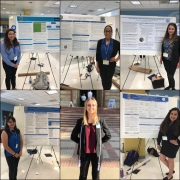Our research Assistants representing CALMA at the 2018 Psychology Undergraduate Research Conference!
In honor of recognizing our CALMA teammates, we want to highlight the research assistants that presented their research at PURC and Undergraduate Research Week last month!
A few of them shared their experiences! See below:
Rosa Hernandez
What is your research about?
My research project aimed to discover whether or not resilience mitigates internalizing symptomatology in rural Latinx adolescents with indirect traumatic exposure–defined as having observed or heard about the trauma of another. Our findings suggest that for youth who experience indirect trauma, resilience may serve as a protective effect against internalizing symptomatology.
What inspired you to research this topic?
Rural populations, due to their geographical location, tend to have less access to mental health resources. Thus, I believe it is important to research the impact that personal characteristics, such as resilience, have on the trajectory of psychological diagnosis to perhaps develop interventions that do not necessarily require seeing a mental health professional on a regular basis.
Hayley Hammons
What is your research about?
My research focused on exploring the effects of pre-treatment expectations on barriers to treatment in the context of an online intervention. We found that participants with low confidence in treatment were more likely to report more barriers to treatment compared to those with neutral or high confidence in treatment. We also found that, on average, participants who did not complete the program reported one more barrier to treatment than those who did complete the program.
What inspired you to research this topic?
I was inspired to study barriers to technology-based interventions because I have always been interested in learning about how online treatments are perceived differently than traditional face-to-face interventions, and whether expectations going into a program can affect treatment outcomes. I was also interested to discover whether online treatments can actually help alleviate barriers to traditional treatment, which has been a huge topic of study since the drastic increase in the use of technology in the 21st century.
Good job ladies! The rest of the CALMA team is very proud of all of you!
Congratulations to Our Graduate Students!
For this month, we want to highlight and congratulate the amazing work our CALMA graduate students are doing!
Gio Ramos is going to be working on the Latino Mental Health Research Training Program, which is a NIH-NIMHD Minority Health and Health Disparities International Research Training (MHIRT) program designed to prepare the very best young researchers to address disparities in mental health care of U.S. Latinos with mental illness. The MHIRT program will afford an invaluable opportunity to continue developing the skills necessary to design multilevel intervention programs that address mental health disparities in Latino communities. Mr. Ramos stated that, “ as part of MHIRT, I will collaborate on a online intervention to reduce stigma and discrimination against mental health patients among health worker.”
Another graduate student, Louise Dixon received the Monica Salinas Summer Research Fellowship and the Graduate Research Mentorship Fellowship. These funding opportunities will help support dissertation research, which is focused on developing health literacy interventions (i.e., fotonovelas) for Latino parents of anxious and depressed youth.
Last, but not least, another graduate student Carolyn Ponting received the NIMH T-32 Predoctoral Training Grant “Bio behavioral Issues in Physical and Mental Health. This grant will allow Ms. Ponting to establish a program of research focused on perinatal mood disorders in underserved women that is methodologically and analytically rigorous (using longitudinal growth models that integrate biopsychosocial risk–infrequently applied to study women of color), multidisciplinary, and translational. Ms. Ponting shared that “given the dearth of perinatal interventions for women with mood disorders, my work under this grant has the potential to improve the quality of interventions available for women of color and to reduce disparities in the mental and physical health of pregnant Latinas and their infants.”
Congratulations to our graduate students on their accomplishments and endless effort to continue to uplift and serve our communities through research!



